With 600 million players and quarterly revenue reaching 7.7 billion US dollars, China remains the world’s most lucrative mobile gaming market. At the same time, regulations for publishing mobile games in China are getting increasingly strict.
Since 2011, Yodo1 has been helping game developers and studios of all sizes achieve success in the Greater China region. Our publishing team is constantly researching new regulations to provide our partners with the most current information.
We covered ISBNs, copyright, and taxes in part 1 of publishing your mobile game in China. Now we’ll focus on:
- How to adapt your mobile game to China’s content restriction
- Information your game is required to display upon startup.
- System changes to make your game compliant with new regulations
Read on for details and demonstrations of how we prepared hit games such as Hand of Fate and Steppy Pants for success in China.
Above: Yodo1 Co-founder presents at the White Nights legal roundtable
Banned Game Content
Certain types of games, such as Mahjong, poker, or a title such as GTA (Grand Theft Auto), are simply not allowed to be published in China because they are seen to promote gambling and criminal activity.
For all other games, the NPPA (National Press and Publication Administration) has created a list of restricted content. You can read a full translation of this list here.
Following is a quick overview of content that will cause the NPPA to deem your game unsuitable and lead to the rejection of your ISBN application, alongside examples of how we implemented changes to help mobile games pass the approval process.
Content Restrictions for Games in China
The following restrictions apply to all game content, including the script, story, maps, scenes, characters, all in-game items, missions, quests, instructions, the music and sound effects used, and the in-game advertisements.
Games published in China cannot include any content that:
- Can be seen as slandering or demeaning the Chinese government, military, constitution, socialist principles, or leadership;
- Misrepresents Taiwan, Hong Kong, the South China Sea, and China’s established borders and political entities in real or fictitious maps. This includes UGC (user-generated content) functions that allow players to modify Chinese borders;
- Distorts facts about China’s history or paints its various ethnic groups in a bad light;
- Endangers China’s social morality or cultural traditions by using vulgar words, showing the destruction of cultural buildings or relics, insulting socially disadvantaged groups, promoting corrupt lifestyles, using power or money for personal gain, or painting Chinese history and culture in a negative light;
- Shows real or fictitious foreign entities invading China;
- Discloses state secrets or confidential information;
- Promotes or glorifies fascism, war, violence, crime, terror, cruelty, torture, or mass destruction;
- Shows blood (of any kind or color);
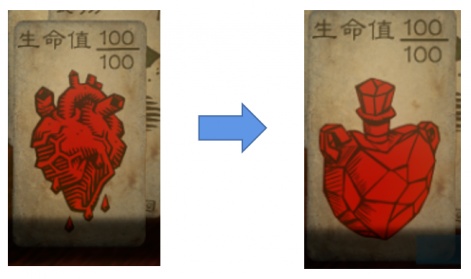
Wondering what you can do when characters die in your game?
Read our article for tips on dealing with China’s updated blood ban.
- Depicts corpses, or skeletons;
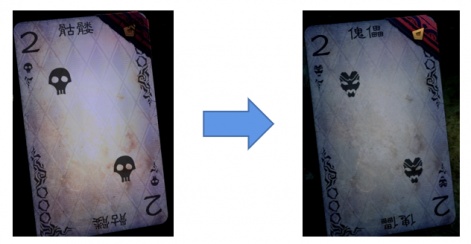
- Shows religious groups, cults, or supernatural phenomena such as fortune-telling, ghosts, zombies, vampires, or anything that is considered too scary;

- Shows obscenity, nudity, pornography, homosexuality, polygamy, concubines, adultery, or addresses sex in any form;
- Insults or slanders others or infringes upon their legal rights and interest, or invades personal privacy;
- Promotes, particularly to minors, the violation of laws or committing of crimes;
- Promotes drug use or trafficking;
- Shows any form of gambling, its function or services, or the use of game points as “virtual currency” in exchange for cash or physical property;
- Encourages minors to use tobacco or alcohol, get married, dismiss school or extracurricular activities, or do any other act unsuitable for minors.
Beyond removing prohibited content, you’ll want to fully translate your game to Chinese, localise any voiceover content, and remove or modify all alphabetical letters or non-Chinese symbols appearing in the game.
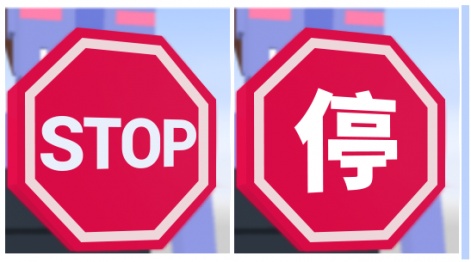
To further localise your characters, design, maps, and stories to appeal to the culture, and for tips on capturing the Chinese audience, check out our articles on user acquisition and localisation practices.
Game Information and System Changes
Western developers who want to publish in China need to implement several system changes in their mobile game to comply with new regulations.
Key modifications are:
- Information at game start-up: showing the healthy gaming notice, copyright information, privacy policy, and terms;
- Anti-addiction system: to regulate playtime for minors;
- Monetisation restrictions: limiting the use of loot boxes;
- Local server requirements: setting up a China-based server for Chinese players.
Yodo1 has developed all the necessary solutions and tools to adapt your game for China. Below are examples and tips on how we can help you implement these requirements.
1. Start-up Screen Information
Healthy gaming notice
Regulations require all games to publish the full text of the Chinese healthy gaming advice text, shown above, in a prominent place on the startup screen.
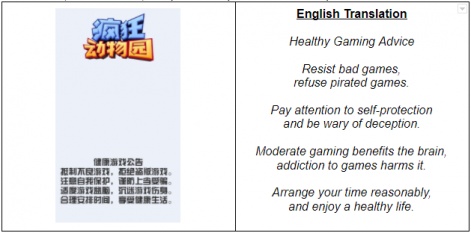
Copyright information, publisher, and ISBN
Following the healthy gaming advice, the game must display information on its copyright owner, and publisher, as well as the ISBN license.
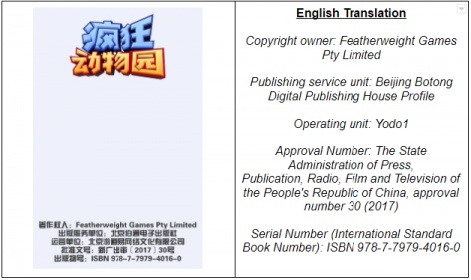
Privacy policy and terms of service
As required anywhere in the world, your game’s opening screen must also include its privacy policy and terms of service, which users must agree to in order to continue.
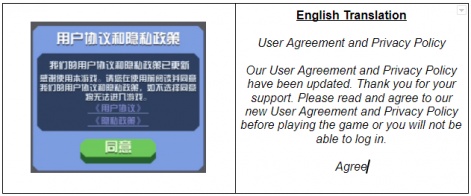
China’s IT governing body is particularly strict on what these policies must contain and how they should be presented to the user. Get in touch with Yodo1 for advice.
2. Anti-Addiction System to Regulate Playtime for Minors
In November of 2019, China announced a plan to limit playing time for children and teenagers under 18 -aiming to counter addiction and avoid distracting minors from achieving academic success.
Currently, the plan includes:
- Player registration: Players of all ages must provide their real name and national ID number in order to play mobile games.
- Playtime limits: Playtime is limited to 90 minutes per day and limited to daytime hours.
- Tourist mode: Developers must convert their registration-free guest mode (if one exists) to a more limited “tourist mode” which gives players access to a 1-hour game demo every 15 days. For full access, registration is required.
Purchasing restrictions: Will apply per child per publishing company, across all games and platforms:
- Ages 0-8: not allowed to make in-game purchases;
- Ages 8-16: RMB 200 per month and RMB 50 per transaction;
- Ages 16-18: RMB 400 per month and RMB 100 per transaction.
- Age rating system: Based on content, type, system, playtime, and payment methods. China’s age rating system for games is still in its development stage; what we know so far is that games must provide a notice of the age group for which the game is appropriate.
- Caregiver involvement: Legal guardians are expected to monitor the gaming time of minors in their care.
- Developer responsibility: Game companies will be expected to comply; those found incompliant can have their license revoked.
In order to fulfill your developer responsibility and protect your game from delisting in the Chinese market, you’ll need to include a player ID registration system and modify your guest mode - to ensure that players register before having full access to the game.
For in-depth information, read how to implement the Player ID registration system.
3. Monetisation Restrictions: Limited Use of Loot Boxes
Announced in May 2019, China’s gacha law affects games that use loot boxes to generate revenue.
Since the regulation, gaming apps must have:
- Daily limits on the number of purchased loot boxes a player can open;
- Clear in-game display of a player’s daily limit;
- Drop chances that gradually change in the player’s favour.
For details, check out our guide to complying with China’s loot-box design rules.
4. Local Server Requirements
After an NPPA update outlined the need for international games to use an exclusive server for Chinese mobile players, our team put together a developer’s guide to setting up a local server.
Firstly, we address a number of the advantages of having a local server in China, including providing players with a more consistent gaming experience and reducing language barriers.
Among the cloud server providers we recommend are:
The Chinese market may not be the easiest to enter but it still represents 33 per cent of the mobile gaming industry’s annual US$ 44 billion profit.
Yodo1-published games such as Rodeo Stampede, Transformers: Earth Wars, and Ski Safari have achieved great success on China’s Apple and Android app stores and our partners have found the payout more than worth their while.
We’re ready to help you publish your game in China, too. Get in touch via bd@yodo1.com.
And while you’re waiting on your ISBN, you can start generating revenue in China right away through the booming, hassle-free HTML5 platform - the hottest way to enter the Chinese gaming market. Contact us!
About Yodo1
Yodo1 is a game platform company that helps developers better market, manage, and monetize their games. Our AI-powered tools and global expertise in areas such as mobile advertising, community management, and digital IP licensing enable partners to increase playtime, revenue, and retention. Our vision is to open the world of gaming success to anyone with the talent to develop. To learn more, visit www.yodo1.com and follow us on LinkedIn.

















